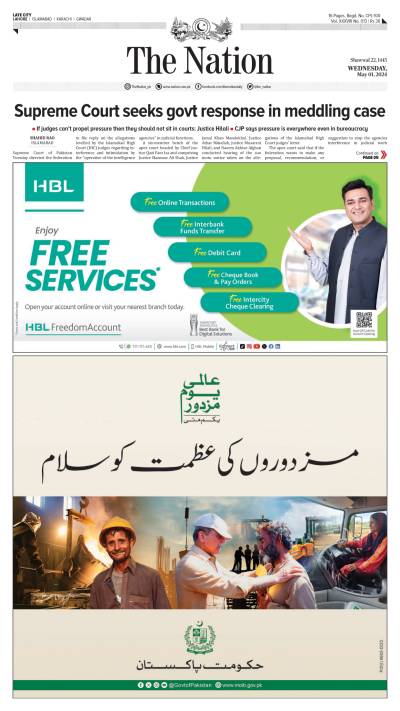Traditionally, Pakistani politics is murky and gets murkier when security agencies jump into the fray. The unwarranted role of intelligence agencies in domestic politics was introduced by both military dictators and politicians. In 1958, whenGeneral Ayub Khanbecame Chief Martial Law Administrator, he expanded the role of intelligence agencies in monitoring opposing politicians to sustain his rule. He used the intelligence agencies during the general elections while contesting Mohtarma Fatima Jinnah to provide inputs to him. In erstwhile East Pakistan, too, intelligence agencies were used to keep track of the activities of Bengali politicians and intellectuals. In later years, they were blamed for creating political alliances and even rigging elections at the behest of the ruling junta. With time, big money entered the game; one example is the "Mehrangate" scandal, in which allegedly top officials of an intelligence agency were given large sums of money by Yunus Habib (the owner of Mehran Bank) to deposit the agencys foreign exchange reserves in Mehran Bank. Many a politician owes his or her debut to intelligence agencies. The history of Pakistans modern intelligence agencies dates back to the colonial times. In that era, the intelligence services, particularly the Criminal Investigation Department (CID) of colonial police, were primarily concerned with protecting the British Raj from any threat to its existence and continuity, which was mainly perceived to come from the political left. Thus in the 1920s, when anti-imperialist movements were prevailing globally, especially in South Asia, the British intensified their surveillance of the left in their Indian colony. Several criminal conspiracy cases were orchestrated by provincial CID networks against a number of trade union leaders and left intellectuals. Two of these cases that attracted much publicity locally and internationally became known as the Kanpur Conspiracy Case (1924) and the Meerut Conspiracy Case (1929). The accused in these cases were charged with entering into conspiracy to deprive the King of the sovereignty of British India under Section 121-A of the Indian Penal Code (1860). After the creation of Pakistan, this pattern of surveillance and harassment of the left continued. In March 1951, Prime Minister Liaquat Ali Khan disclosed a conspiracy to overthrow his government. Soon thereafter a number of political activists and litterateurs, including Faiz Ahmed Faiz, were arrested and jailed. In the recent past, the political wing of the military intelligence agencies has been shut down, while the indulgence and dalliance with political leaders and parties has been curtailed. Unfortunately, some political leaders, who fail to make their entry into the corridors of power through democratic means, continue to approach the military to ambush the democratic process and instal them at the seat of government through the backdoor. However, it is a healthy trend that the military has ceased to succumb to the pressures of this nature and has no aspiration for entering the power portals. Yet, the politicians have not stopped besmirching the good name of the intelligence agency, ISI. Observing certain political leaders rising to unparalleled heights of popularity, they are quick to brand such politicians to be the protg of intelligence agencies, ignoring their mass appeal and public support acquired by dint of their own talent and hard work. The time has come for the masses to judge which leader is worth his or her salt and who merits receiving the confidence of people to represent them in Parliament. With a vibrant and free media, which does not leave any stone unturned in exposing the wrongdoing and transgression, and a free and fair judicial system prevalent in Pakistan, it is becoming exceedingly difficult for the politicians to get away with sleaze and perfidy. Corruption scandals are being exposed and electoral malpractices unearthed; this is paving the way for free and fair elections. For corrupt and dishonest politicians to slander the clean ones, accusing them of being propped up by intelligence agencies, will not hold water any longer. Some critics accuse them of having become another Frankenstein, an unbridled demon, a State within a State. However, they should remember that intelligence agencies are tools in the governments hands, which can be used at its whim. If the government of the day continues to use them for securing national interests, it is welcome. But any effort to misuse it for dilly-dallying in politics is abhorrent and should be avoided. The writer is a political and defence analyst. Email: sultanm.hali@gmail.com
Thursday, May 02, 2024
Intelligence agencies and politics
IHC seeks 'proof' ex-PM retained cipher
5:05 PM | May 01, 2024
Deputy PM Ishaq Dar arrives in Gambia to represent Pakistan at OIC Summit
5:04 PM | May 01, 2024
Google marks World Labour Day with special doodle
5:03 PM | May 01, 2024
Punjab police need reforms, donning uniforms doesn't solve problems: Gandapur
5:02 PM | May 01, 2024
Maryam launches field hospitals project to bring healthcare to people's doorsteps
5:01 PM | May 01, 2024
Cross Border Killings
May 01, 2024
Procurement Protests
May 01, 2024
Partner in Arms
May 01, 2024
Media Under Siege
April 30, 2024
Regional Resurgence
April 30, 2024
Labour liberation
May 01, 2024
DNA discoveries
May 01, 2024
Cloud health revolution
April 30, 2024
Revolutionising rural learning
April 29, 2024
Information failure
April 29, 2024
ePaper - Nawaiwaqt
Advertisement
Nawaiwaqt Group | Copyright © 2024





